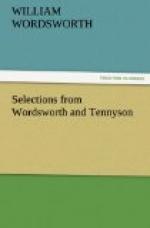In 1828 Charles and Alfred Tennyson matriculated at Trinity College, Cambridge, where their elder brother Frederick had already been for some time. Alfred was a somewhat shy lad, and did not at once take kindly to the life of his college. He soon, however, found himself one of a famous society known as “The Apostles,” to which belonged some of the best men in the University. Not one member of the “Apostles” at this time, but afterwards made a name for himself, and made his influence felt in the world of politics or letters. The society met at regular intervals, but Alfred did not take much part in the debates, preferring to sit silent and listen to what was said. All his friends had unbounded admiration for his poetry and unlimited faith in his poetic powers. This faith was strengthened by the award of the University Prize for English Verse to Alfred in June, 1829. He did not wish to compete, but on being pressed, polished up an old poem that he had written some years before, and presented it for competition, the subject being Timbuctoo. The poem was in blank verse and really showed considerable power; in fact it was a remarkable poem for one so young.
Perhaps the most powerful influence on the life of Tennyson was the friendship he formed while at Cambridge with Arthur Henry Hallam, the son of the historian, Henry Hallam. The two became inseparable friends, a friendship strengthened by the engagement of Hallam to the poet’s sister. The two friends agreed to publish a volume of poems as a joint-production, but Henry Hallam, the elder, did not encourage the project, and it was dropped. The result was that in 1830, Poems, Chiefly Lyrical, was published with the name of Alfred Tennyson alone on the title page. The volume was reviewed enthusiastically by Hallam, but was more or less slated by Christopher North in the columns of Blackwoods’ Magazine. Tennyson was very angry about the latter review and replied to the reviewer in some caustic, but entirely unnecessary, verses.
In the same year Hallam and Tennyson made an expedition into Spain to carry aid to the rebel leader against the king of Spain. The expedition was not by any means a success. In 1831 Tennyson left Cambridge, without taking his degree, and shortly after his return home his father died. The family, however, did not remove from Somersby, but remained there until 1837. Late in 1832 appeared another volume entitled Poems by Alfred Tennyson. This drew upon the unfortunate author a bitterly sarcastic article in the Quarterly, written probably by its brilliant editor, John Gibson Lockhart. The result of this article was that Tennyson was silent for almost ten years, a period spent in ridding himself of the weaknesses so brutally pointed out by the reviewer.
In 1833, Arthur Henry Hallam died, and for a time the light of life seemed to have gone out for Alfred Tennyson. The effect of the death of Hallam upon the poet was extraordinary. It seemed to have changed the whole current of his life; indeed he is said, under the strain of the awful suddeness and unexpectedness of the event, to have contemplated suicide. But saner thoughts intervened, and he again took up the burden of life, with the determination to do what he could in helping others. From this time of storm and stress came In Memoriam.




